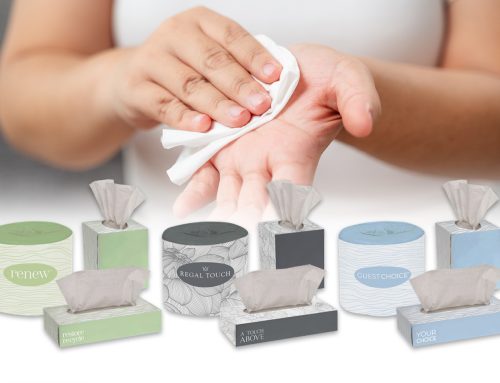As of January 2023, a handful of states introduced legislation to ban the sale of consumer goods made with synthetic chemicals that have been linked to a range of health problems, including cancer, thyroid disease, and developmental issues. Concern over the use of PFAS – which stands for per- and polyfluorinated substances – has grown as states began implementing restrictions on its use. So, what does this mean for hospitality businesses?
If your hotel or restaurant uses products that contain PFAS materials, such as carpeting, upholstery, food trays, pizza boxes, plates, cups, and bowls, you will need to find alternatives that do not contain these chemicals. Fortunately, Guest Supply has an assortment of disposable, PFAS-free food service items to stay ahead of incoming bans, which are soon to be adopted by more states. In this blog, we’ll explore the PFAS ban in more detail and provide tips for how to find PFAS-free products.
What is PFAS?
PFAS are synthetic chemicals used as a coating for disposable products to make them resistant to oils, water, and heat. PFAS is commonly known as “forever chemicals” because they cannot break down in the environment or in the human body. Exposure to PFAS has been linked to various health risks, including cancer, hormonal disruption, liver damage, weakened immune system, or increased cholesterol levels.
It is important to note that the extent of the health risks associated with PFAS exposure is still being studied, and new research is constantly emerging. However, given the potential risks, many organizations, including the U.S. Environmental Protection Agency (EPA), are taking steps to restrict the use of disposable products/materials containing PFAS chemicals.
How the PFAS Ban Affects the Hospitality Industry
Many products commonly used in hotels and restaurants, including certain types of carpeting, upholstery, food packaging, non-stick cookware, firefighting foam, cleaning products, and personal care products contain PFAS. The Centers For Disease Control And Prevention reports that exposure can occur from drinking contaminated water, eating food in PFAS packaged materials, or using products such as stain-resistant carpeting, among others. If a ban on PFAS is implemented for all states, businesses in hospitality will need to find alternatives to these products.
However, the potential benefits of a PFAS ban are also significant. By reducing exposure to these chemicals, hotels can help protect the health and safety of guests and staff. Additionally, by making the switch to PFAS-free products, hotels can demonstrate their commitment to environmental sustainability and responsible business practices.
Finding PFAS-Free Products
In order to get ahead of the ban, conduct a thorough assessment of your business operations and supply chains to identify any products that may contain PFAS and begin transitioning to PFAS-free alternatives. Guest Supply offers an assortment of disposable, PFAS-free food service items to ensure the health and safety of your guests and to provide environmentally friendly options for all your food service needs.
Empress Earth PFAS-Free plates and bowls are made from renewable sugarcane by-products without the use of PFAS coatings. Plus, these plates and bowls are resistant to heat, water, and oil. Agave offers sustainable cups, cutlery, containers, and more made from up-cycled agave plant fiber and free of PFAS chemicals. This cutlery option is also biodegradable and compostable.
Communicating Changes to Guests
It’s important to be transparent about these changes with guests and share the reasons behind the transition to PFAS-free products. Be sure to explain the potential health risks associated with PFAS and how the switch to PFAS-free products will help mitigate these risks. You can provide guests with information about the PFAS-free products with in-room brochures or signage in public areas. Additionally, be sure to train hotel staff to answer questions from guests about the transition to PFAS-free products and provide them with accurate and up-to-date information about the safety of these products.





